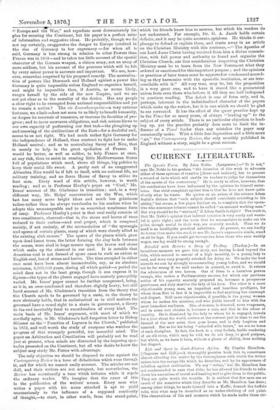CURRENT LITERATURE.
The Queen's Taxes. By John Noble. (Longmans.)—" It is not," says Mr. Noble in his preface, ‘` the intention of this work to advocate either of these systems of taxation [direct and indirect], but to present a record of facts which will enable its readers to judge for themselves
of the merits of the controversy." He is ready to allow, however, that his conclusions have been influenced by the opinions ho himself enter- tains. Our chief complaint against him is that ho does not know quite clearly what ho wants. Ho quotes as an axiom of the science Adam Smith's dictum that "each subject should contribute according to his ability," but seems, a few pages further on, to complain that the opera- tive who consumes tobacco cannot be called "an untaxed working-man." But why should he be "untaxed," if Adam Smith is right ? The truth is, that Mr. Noble's opinion that indirect taxation is very costly and waste- ful is quite right ; and the facts that ha accumulates to make out his point, though useful in their way, are scarcely needed. What we do need is an intelligible practical substitute. At present, we can hardly do better than make the stool, to use Mr. Lowe's expressive simile, stand on all its legs. If you could get income-tax from those who earn weekly wages, one leg would be strong enough.


































 Previous page
Previous page